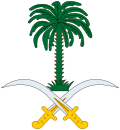| Ambassador of Saudi Arabia to Turkey | |
|---|---|
| سفير خادم الحرمين الشريفين لدى جمهورية تركيا (Ambassador of the Custodian of the Two Holy Mosques to Turkey) | |
 Coat of Arms of Saudi Arabia | |
| Inaugural holder | Fouad Bey Hamza |
| Formation | 1943 |
The Saudi ambassador in Ankara is the official representative of the Government in Riyadh to the Government of Turkey, concurrently he is accredited to Baku (Azerbaijan).